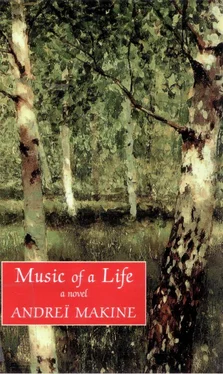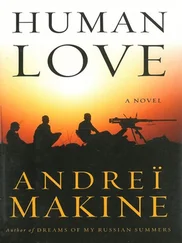
Andrei Makine
Music of a Life
Translated from the French by Geoffrey Strachan
Andrei Makine was born and brought up in Russia, but Music of a Life, like his other novels, was written in French. The book is set in Russia, and the author uses some Russian words in the French text that I have kept in this English translation. These include shapka , a fur hat or cap, often with ear flaps; dacha, a country house or cottage, typically used as a second or vacation home; izba , a traditional wooden house built of logs; and taiga, the virgin pine forest that spreads across Siberia south of the tundra.
The text contains references to several well-known Russian place names, including the Nevsky Prospekt, the street in St. Petersburg (on the river Neva); in Moscow, the Stone Bridge and Arbat, the famous street in the city center; and Graben, the street in the heart of Vienna.
G. S.
I COULD QUITE EASILY PINPOINT THE DATE of that encounter. It goes back at least a quarter of a century – more precisely, to the year when a celebrated Russian philosopher, then a political refugee in Munich, coined a phrase that quickly gained currency, an expression thinkers, politicians, and even mere mortals would go on using for a good decade or more throughout the world. The extraordinary success enjoyed by his formula stemmed from one palpable merit: in two Latin words the philosopher had succeeded in summing up the lives of the 240 million human beings who, at that time, peopled the land of my birth. Men and women, children and adults, old people and newborn babes, the living and the dead, the sick and the healthy, innocents and murderers, the learned and the ignorant, workers in the depths of coal mines, cosmonauts in their celestial orbits – these and thousands of other categories of people were all linked to a common essence by this innovative expression. They all began to exist under one generic name.
Both before and since this inspired invention, people have endlessly dreamed up combinations of words to characterize the country in question. "The Evil Empire," "barbarism with a human face," "the shattered empire" – each of these locutions made its mark on Western minds for a time. Nonetheless, the Munich philosopher's definition was by far the most often quoted and the most enduring.
To such an extent that, barely a few months after the phrase made its appearance, I heard it on the lips of a friend who, like me, lived on the banks of the Neva, and like so many others listened secretly to Western radio stations and had heard an interview with the philosopher. Yes, to such an extent, in fact, that once, when I was returning from a trip to the Far East and was held up by a snowstorm somewhere in the heart of the Urals, I recalled this term, extolled in the West but prohibited in our country, and spent part of the night applying it to the passengers who surrounded me in the waiting room of a dark, icy railroad station. The term coined by the philosopher proved to be devastatingly telling. It embraced the lives of the most diverse individuals: two soldiers, hidden behind a pillar, taking turns drinking from a bottle; an old man who, since there were no more seats, was sleeping on a newspaper spread out along one wall; a young mother whose face seemed as if it were glowing slightly, lit by an invisible candle; a prostitute watching at a snow-covered window; and a great many others.
Marooned there amid my fellow human beings, some sleeping, some wakeful, I was privately marveling at the philosopher's perspicacity… And it was at that very moment, in the depths of a night cut off from the rest of the world, that the encounter took place.
Since then a quarter of a century has passed. The empire whose fragmentation was predicted has collapsed. Barbarism and evil have manifested themselves under other skies as well. And the formula invented by the Munich philosopher, who was, of course, Alexander Zinoviev – the defining phrase, almost forgotten today – simply serves me as a signpost, marking the moment of that brief encounter in the muddy tide of the years.
I have just awoken, having dreamed of music. The final chord fades away within me while I try to focus on individuals amid the living, breathing mass packed into this vast waiting room, in this mixture of sleep and weariness.
A woman's face, there, close by the window. Her body has just been giving pleasure to one more man; her eyes are searching among the passengers for her next lover. A railroad worker comes in quickly, crosses the room, leaves through the big door that leads out onto the railroad platforms, into the night. Before closing, the door hurls a violent flurry of snow into the room. The people settled near the door stir on their hard, narrow bench, tug on their coat collars, shake their shoulders with a shiver. From the other end of the station comes a muffled guffaw, then the crunch of a fragment of glass beneath a foot, an oath. Two soldiers, their shapkas pushed back on their heads, their overcoats unbuttoned, beat a path through the mass of huddled bodies. Snores call out to one another, some of them comically in harmony. The wail of an infant rings out very clearly in the darkness, fades into little whimperings as it sucks, falls silent. A long argument, dulled by boredom, is taking place behind one of the pillars that hold up a varnished wooden gallery. The loudspeaker on the wall crackles, hisses, and suddenly announces, in astonishingly soothing tones, that a train is going to be delayed. An ocean swell of sighs ripples through the waiting room. But the truth is that no one expects anything anymore. "Six hours' delay" – it could be six days or six weeks. Numbness returns. The wind whips heavy white squalls against the windows. Bodies settle down against the hardness of the benches, strangers press close together, like the scales of a single protective shell. Night fuses the sleepers into one living mass – a beast savoring, with every cell in its body, its good fortune at being under cover.
From my position I can hardly see the clock that hangs above the ticket windows. I turn my wrist, the dial of my watch catches the glow from the nightlight: quarter to one. The prostitute is still at her post; her silhouette stands out against the window made blue by the snow. She is not tall, but very broad in the hips. She towers above the ranks of sleeping travelers. It looks like a battlefield strewn with dead… The door leading to the town opens, new arrivals come in, bringing with them the cold and discomfort of open spaces scoured by snow flurries. The human protoplasm shivers and grudgingly makes space for these new cells.
I shake myself in an attempt to wrest myself away from this conglomeration of bodies. To wrest those immediately around me from the blur of the whole mass. The old man, who has just arrived and lays no claim to a seat in this crowded station, spreads a newspaper out on the tiled floor, filthy with cigarette butts and melted snow, before lying down, his back against the wall. The woman whose features and age are concealed by her shawl, an unknowable being swathed in a huge, shapeless coat. A moment earlier she was talking in her sleep, a few pleading words that doubtless surfaced from many years back, from her life long ago. The only clue to her humanity I'll ever have, I muse. This other woman, this young mother, bowed over the cocoon of her baby, which she seems to envelop in an invisible halo made up of anxiety, wonder, and love. A few steps away from her the prostitute is busy negotiating with the soldiers: the two men's excited jabbering and her whispering, a little disdainful but warm and as if moist with luscious promise. The soldiers' boots clatter on the flagstones; one can sense, physically, the eagerness her body provokes, with its broad, heavy backside and thrusting bosom under the coat. And there, almost on a level with the boots, the face of a man asleep, partly slipped from his bench, his head thrown back, his mouth half open, one hand touching the ground. A dead man on a battlefield, I say to myself again.
Читать дальше













